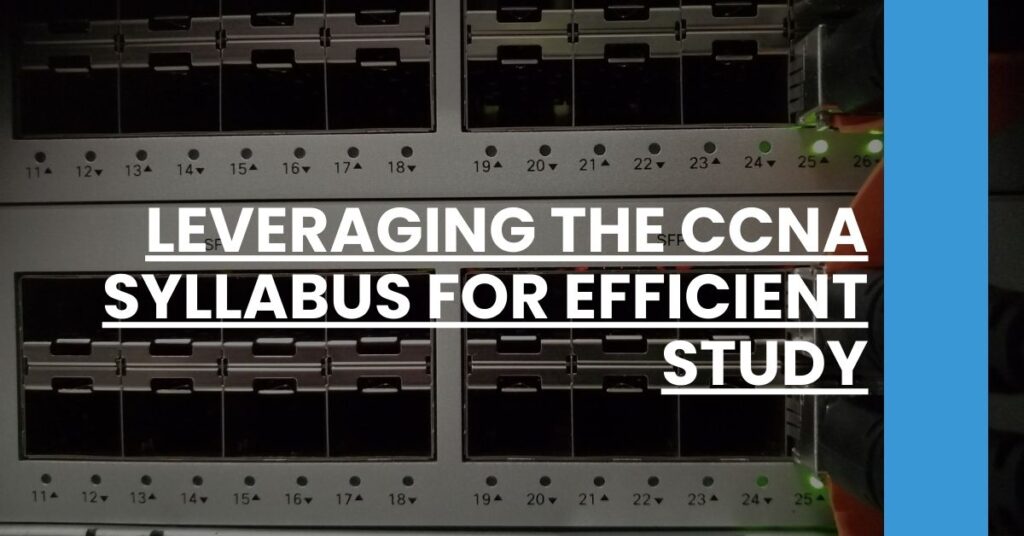Unlock your potential in networking with the CCNA exam syllabus, your guide to mastering the essentials.
- Detailed Understanding: Grasp the core concepts of networking with our breakdown of the syllabus.
- Exam Preparation: Learn the best practices for studying and excelling in the CCNA exam.
- Career Advancement: Utilize the syllabus to enhance your skills and elevate your networking profession.
With the CCNA exam syllabus, embark on a journey to networking expertise.
Understanding the CCNA Certification
The Cisco Certified Network Associate (CCNA) certification is a prestigious credential that sets the foundation for a rewarding career in the IT networking industry. It demonstrates a professional’s ability to install, configure, operate, and troubleshoot medium-sized network systems. Whether you’re just starting out or looking to advance, the CCNA certification is often considered a stepping stone toward more specialized and higher-level credentials.
Who Should Aim for the CCNA?
For Beginners: If you’re new to networking, the CCNA is an ideal starting point. It covers the essentials and provides a comprehensive introduction. For Professionals: For IT pros already in the field, the CCNA reinforces knowledge and skills, preparing you for more complex challenges ahead.
Cisco 200-301 Exam Overview
Understanding the CCNA exam layout is a critical step in your journey. The exam, called 200-301 CCNA, incorporates a variety of question formats including multiple-choice, simulation, testlet, and drag-and-drop, designed to test your practical knowledge. You’ll have 120 minutes to demonstrate your networking mettle.
Exam Details:
- Exam Code: 200-301 CCNA
- Exam Duration: 120 minutes
- Question Formats: Multiple-choice, Simulations, Drag-and-drop
- Passing Score: Cisco does not publish the passing score, as it is subject to change.
Detailed CCNA Exam Topics Breakdown
The CCNA exam syllabus is detailed, covering several critical domains of knowledge required in today’s networking environments. Understanding these topics is key to your success.
1. Network Fundamentals
You’ll begin with the bedrock of networking – the fundamentals. This encompasses various communication models, network types (including LANs and WANs), and the critical internet protocol suite.
Topics Covered:
- Network Topologies: Understand the layout of networks.
- Internet Protocols: Grasp the essentials of IPv4 and IPv6.
2. Network Access
Delving deeper, this segment explores how devices access the network and communicate. Think of VLANs as private parties within a larger venue – they allow for segmentation within a switch.
Key Concepts:
- VLANs: Learn how they segment network traffic.
- Spanning Tree Protocol (STP): Prevent loops in your network.
- Wireless Principles: Covering the foundations of WLAN architecture.
3. IP Connectivity
This is where your understanding of IP addressing and routing protocols like OSPF will be assessed. You’ll need to know how different devices on a network find the best path to communicate.
Core Areas:
- IP Addressing: Master IP allocation and subnetting.
- Routing Protocols: Explore OSPF, an essential routing protocol.
- Router Configuration: Get hands-on with routing tasks.
Refer to the comprehensive explanation of these core areas to build upon your knowledge.
IP Services
Understanding IP Services is a critical part of your CCNA exam syllabus, encompassing the essential services that keep the network optimally functioning and secure. Consider these services as the supporting cast that fine-tune the network’s performance and usability.
DHCP and NAT
Within the IP Services section, you’ll dive into critical functionalities that every network relies on:
- Dynamic Host Configuration Protocol (DHCP): This is a network management protocol used to automate the process of configuring devices on IP networks. As you study DHCP, you’ll learn how to enable devices to communicate on the network without manual intervention, which is crucial for efficient network management.
- Network Address Translation (NAT): NAT is a method of remapping IP addresses by modifying network address information. Your understanding of NAT will show how internal network security can be maintained by keeping internal IP addresses hidden from the outside world.
Quality of Service (QoS)
Quality of Service (QoS): Maintaining a network that performs effectively under various loads is imperative. You’ll explore QoS and how it prioritizes critical data over less important traffic, ensuring efficient delivery of important communications, especially when bandwidth is limited.
Additional IP Services
Moreover, your CCNA exam syllabus covers additional IP services, which are essential for the seamless operation of a network:
- Simple Network Management Protocol (SNMP): SNMP manages devices on IP networks. Your ability to work with SNMP reflects your capability to monitor network performance, detect network faults, and manage network configurations.
- Syslog: This standard for message logging allows you to gather different types of system messages to monitor and troubleshoot network issues.
Through understanding and configuring these services, you’re paving the way for a robust, responsive network infrastructure. Explore detailed explanations of these services to better comprehend their roles and configurations.
Security Fundamentals
In today’s digital age, network security is paramount. The CCNA exam syllabus reflects this by testing your knowledge in a variety of security practices and technologies designed to safeguard network data.
Access Control Lists (ACLs)
One of the pillars of network security is the Access Control List (ACL). ACLs are a fundamental security feature that enable you to filter traffic based on a set of rules. You will need to demonstrate a solid comprehension of both standard and extended ACLs and their applications to ensure only authorized users can access certain network resources.
VPNs and Firewalls
The syllabus also covers security mechanisms such as:
- Virtual Private Networks (VPNs): VPNs are extensively used to provide secure connections over the internet. You’ll explore how data can be transmitted securely between remote users and the corporate network.
- Firewalls: As a network technician, you will work with firewalls to block unauthorized access while permitting outward communication. Your understanding of firewalls is crucial to protect the network from threats.
Furthermore, you’ll gain a solid understanding of wireless security protocols and device hardening techniques to protect against threats and ensure the integrity of the network.
Automation and Programmability
Automation & programmability are no longer just buzzwords – they are vital components of modern networking. The CCNA exam syllabus introduces you to the transformative power of automation in the network field.
Network Automation
- Controllers and APIs: The controllers serve as central points from which the network can be managed intelligently. By understanding Application Programming Interfaces (APIs), you will grasp how software intermediates in network configurations and management, boosting efficiency and reducing the scope for human error.
- Configuration Management Tools: For example, Ansible is an automation tool that is used for configuration management. You’ll explore how these tools can automate repetitive tasks, ensuring your network operates consistently and smoothly.
Programming Concepts
- Python Basics: Python is a popular scripting language in network automation. Your familiarity with Python as part of the CCNA syllabus signifies your readiness to engage with script-based automation tasks within network environments.
With the industry’s trend toward these technologies, your ability to adapt and leverage automation will be indispensable. These skills are shaping the future of networking; understanding the role of network automation techniques will position you at the forefront of this evolution.
Preparation Tips for the CCNA Exam
Approaching the CCNA examination with confidence requires methodical preparation. Considering the breadth of topics within the CCNA exam syllabus, your strategy should be comprehensive, refining both your theoretical knowledge and practical skills.
- Holistic Understanding: Aim to internalize how different networking components work together rather than memorizing individual facts.
- Hands-On Practice: Test your skills with simulation tools and real networking equipment to enforce your theoretical knowledge practically.
- Official Study Materials: Utilize official Cisco press books and Cisco Learning Network resources, ensuring that your learning material is aligned with the official syllabus.
Solidify your study habits with these study tips that seasoned network professionals recommend.
Maintaining and Renewing Your CCNA Certification
The culmination of your effort doesn’t end at certification; maintaining your CCNA is about keeping your knowledge current and your skills sharp.
- Continuing Education Credits: Cisco offers continuing education programs where you can earn credits through various learning activities to renew your certification.
- Recertification Exams: Staying up-to-date can also be achieved by passing specified exams before the end of your certification cycle, keeping the CCNA valid.
Ensure you’re familiar with Cisco’s recertification policies to stay ahead of the curve.
Conclusion
By now, you should have a comprehensive understanding of the CCNA exam syllabus, a beacon that guides your study journey towards networking expertise. This syllabus is more than a list of topics; it represents a blueprint for a solid foundation in networking and a springboard for a future that’s shaped by your newfound skills and knowledge. Whether it’s configuring a router or automating a complex network task, your proficiency in these areas will increasingly become part of your professional narrative. The CCNA certification is not just a milestone—it’s a journey of continuous growth and enrichment in the vast, evolving landscape of network technology. Embark on this journey with determination and embrace the opportunities that come with becoming a Cisco Certified Network Associate.

